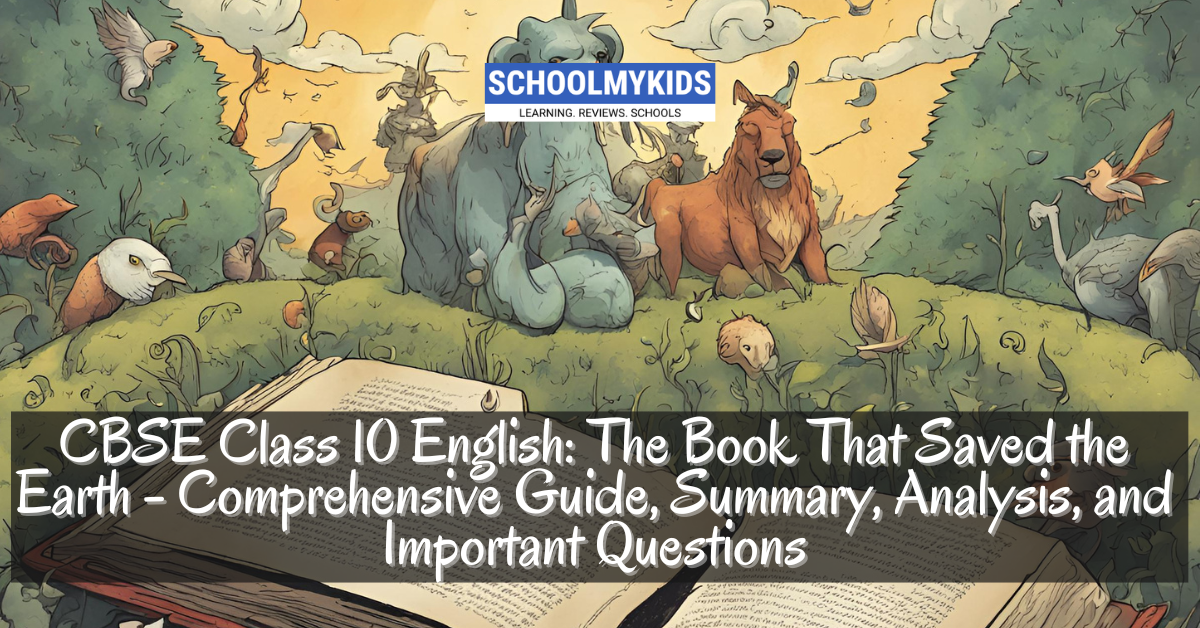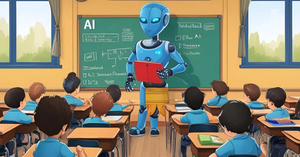“The Book That Saved the Earth” is a chapter from the Class 10 CBSE English textbook, “Footprints without Feet”
Summary of The Book That Saved the Earth
“The Book That Saved the Earth” is a delightful and imaginative play by Claire Boiko, included in the CBSE Class 10 English curriculum. The play is set in the 25th century and revolves around a humorous and fantastical scenario where a children’s book becomes the unexpected savior of Earth. The narrative explores themes of misunderstanding, cultural differences, and the power of literature.
The play begins in the Museum of Ancient History, where a Historian introduces the audience to a significant event from the 20th century. The story centers on the Martians, who, led by the Great and Mighty Think-Tank, plan to invade Earth. The Martians perceive themselves as superior and believe Earth to be an easy target for conquest. However, their plans are hilariously thwarted by their misinterpretation of a simple nursery rhyme book, “Mother Goose.”
Think-Tank, who considers himself the most intelligent being in the universe, grossly misinterprets the nursery rhymes. For example, he interprets “Humpty Dumpty” as a dangerous weapon and “Twinkle, Twinkle, Little Star” as an advanced astronomical code. His absurd conclusions lead to a series of comedic misunderstandings among the Martians.
The Martians’ fear of Earth’s supposed advanced technology, as depicted in the nursery rhymes, ultimately leads Think-Tank to abort the invasion plan. The play concludes with the Historian explaining how the simple book of nursery rhymes inadvertently saved Earth from an alien invasion.
Analysis
“The Book That Saved the Earth” is a humorous and satirical play that highlights the power of literature and the potential for miscommunication across different cultures. The play uses comedy to underscore the absurdity of the Martians’ interpretations and the unintended consequences of their actions.
The character of Think-Tank is central to the play’s humor. His arrogance and ignorance create a series of comical situations that drive the narrative. Despite his self-proclaimed intelligence, Think-Tank’s inability to understand the simple nursery rhymes leads to the play’s resolution, showcasing the theme of how overconfidence can lead to downfall.
The play also explores the idea of cultural misunderstanding. The Martians, with their advanced technology, fail to grasp the simplicity and innocence of Earth’s nursery rhymes. This cultural gap results in their misguided fear and ultimately saves Earth. The narrative suggests that understanding and communication are crucial in overcoming differences and avoiding unnecessary conflicts.
The use of a children’s book as the pivotal element in the play underscores the importance of literature and imagination. It demonstrates how something as simple and innocent as nursery rhymes can have profound and unforeseen impacts.
Important Questions with Explanations
- What is the central theme of “The Book That Saved the Earth”?
- The central theme is the power of literature and the potential for cultural misunderstandings. The play highlights how a simple children’s book can lead to significant consequences due to misinterpretation.
- Describe the character of Think-Tank.
- Think-Tank is the arrogant and self-proclaimed leader of the Martians. His overconfidence and ignorance lead to a series of comical misunderstandings, ultimately thwarting the Martian invasion.
- How does the play use humor to convey its message?
- The play uses humor through the absurd interpretations of nursery rhymes by Think-Tank and the Martians. This comedic approach underscores the themes of cultural misunderstanding and the power of literature.
- What role does the book “Mother Goose” play in the story?
- “Mother Goose” is the children’s book that the Martians misinterpret as a dangerous and advanced document. This misinterpretation leads to the cancellation of the invasion, making the book the unexpected savior of Earth.
- How does Think-Tank’s arrogance contribute to the plot?
- Think-Tank’s arrogance and self-assuredness blind him to the true nature of the nursery rhymes. His misguided conclusions drive the plot and lead to the play’s humorous resolution.
- Discuss the significance of the Historian in the play.
- The Historian serves as the narrator, providing context and framing the story. The Historian’s explanations help the audience understand the significance of the events and the play’s satirical elements.
- What message does the play convey about cultural differences?
- The play highlights that cultural differences can lead to misunderstandings. It suggests the importance of communication and understanding to bridge these gaps and avoid conflicts.
- Analyze the impact of literature as depicted in the play.
- Literature, represented by “Mother Goose,” is shown to have a profound impact despite its simplicity. The play suggests that literature can influence perceptions and actions in unexpected ways.
- How does the play portray the Martians’ view of Earth?
- The Martians view Earth as primitive and inferior. However, their misinterpretations of the nursery rhymes reveal their lack of understanding and lead to their comical fear of Earth’s supposed advanced technology.
- What lesson can be learned from Think-Tank’s character?
- Think-Tank’s character teaches that overconfidence and ignorance can lead to misguided actions and decisions. It emphasizes the importance of humility and open-mindedness.
- How do the nursery rhymes contribute to the plot?
- The nursery rhymes are central to the plot as their misinterpretation by the Martians creates the conflict and resolution. They serve as a humorous device to highlight the theme of cultural misunderstanding.
- Discuss the role of imagination in the play.
- Imagination plays a key role, both in the creation of the nursery rhymes and in the Martians’ exaggerated interpretations. The play celebrates the creativity and unpredictability of imagination.
- What is the significance of the setting in the 25th century?
- The futuristic setting adds to the play’s imaginative and fantastical elements. It contrasts the advanced technology of the Martians with the simplicity of the nursery rhymes.
- How does the play address the theme of miscommunication?
- The play addresses miscommunication through the Martians’ inability to understand the nursery rhymes. This miscommunication leads to the central conflict and resolution, highlighting its potential consequences.
- What does the play suggest about the nature of intelligence?
- The play suggests that intelligence is not just about technological advancement but also about understanding and interpreting information correctly. Think-Tank’s failure shows that intelligence without wisdom can lead to absurd conclusions.
- How does the play use satire to convey its themes?
- The play uses satire to mock the Martians’ interpretations and Think-Tank’s arrogance. This satirical approach highlights the absurdity of their actions and underscores the play’s themes.
- Analyze the significance of the title “The Book That Saved the Earth”.
- The title reflects the central plot device—a book of nursery rhymes—that inadvertently saves Earth. It highlights the power of literature and the unexpected ways it can influence events.
- What role do the other Martian characters play in the story?
- The other Martian characters, like Noodle, provide additional humor and contrast to Think-Tank’s arrogance. Their reactions and interactions contribute to the comedic elements and the unfolding of the plot.
- How does the play explore the concept of fear?
- The play explores fear through the Martians’ exaggerated reactions to the nursery rhymes. Their fear, based on misunderstandings, drives the plot and leads to the humorous resolution.
- What overall message does “The Book That Saved the Earth” convey?
- The play conveys that literature has the power to influence perceptions and actions. It also highlights the importance of understanding and communication in overcoming cultural differences and avoiding unnecessary conflicts.
Conclusion
“The Book That Saved the Earth” by Claire Boiko is a humorous and thought-provoking play that explores themes of cultural misunderstanding, the power of literature, and the pitfalls of arrogance and miscommunication. Through the comical misinterpretations of nursery rhymes by the Martians, the play highlights the importance of understanding and open-mindedness. For students preparing for the CBSE Class 10 English exam, this story provides valuable insights into character development, thematic exploration, and narrative techniques, enriching their literary knowledge and analytical skills.








Be the first one to comment on this story.